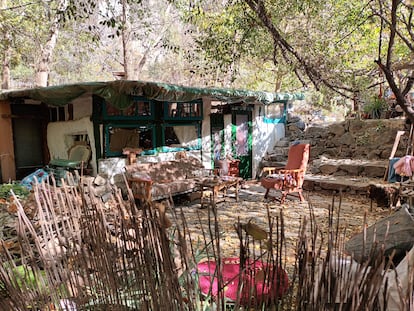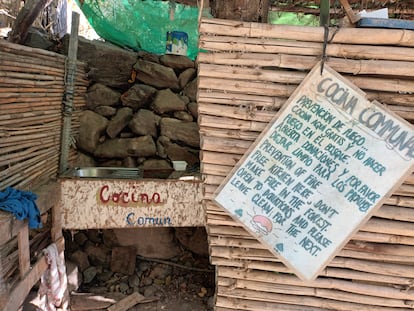How a flower power child nearly killed a co-founder of Spain’s far-right party Vox
Naraya G. is now in prison for shooting Alejo Vidal-Quadras, a prominent politician who served as first vice president of the EU Parliament. EL PAÍS traveled to the hippy commune where the attacker grew up, in Granada’s famous Alpujarra region

Since his arrest on November 20 for allegedly organizing the shooting in broad daylight of Alejo Vidal-Quadras — one of the founders of Spain’s ultranationalist Vox party who earlier served as vice president of the EU Parliament — Naraya G. has been rumored to be the son of an Israeli citizen who brought him up in a hippy commune in Granada’s Alpujarra, a mountain region that was popularized among English speakers by Gerald Brenan’s South From Granada and, much later, by Chris Stewart’s best-selling Driving Over Lemons.
According to those who know him, Naraya G. did indeed grow up in a commune named Beneficio, which is located in a huge ravine just ten minutes from Órgiva, a town of 5,791 inhabitants in the southern Spanish province of Granada. But rather than Israeli, his father is Syrian and still lives in the commune, although he did not wish to talk or be photographed.
A radicalized Shiite according to police reports, Naraya G. has always maintained close links to the commune. EL PAÍS visited Beneficio just days after Naraya G.’s arrest, but found it impossible to locate his father. In Beneficio, everyone has a different take on the attack on Alejo Vidal-Quadras on November 9 that saw the politician shot in the face by a passing motorcyclist in Madrid, leaving him with a fractured jawbone.
Some people in Beneficio know what happened, others do not, and yet others pretend not to. Some even dare to come up with theories involving the Israeli intelligence agency, Mossad. But the most plausible theory is that Iran was behind the assassination attempt.
The spokesman for the Beneficio commune, Edgar Thompson, a Peruvian national who moved to Granada in the late 1980s from the U.S. and bought part of the land on which the commune was established, was in Germany when EL PAÍS visited, according to those familiar with his movements, though in Beneficio, nobody feels obliged to offer explanations and, quite often, would rather not.
Mateo, who is originally from the nearby province of Jaén, came to the commune for a weekend and is still here 14 years later. He is one of the few who are willing to talk. “I’ve seen him around recently,” he said of Naraya G. who he has known since he was a small boy. Now, he says, he must be just over 20. He is unsure whether Naraya was born in the commune itself.
“More than 10 years ago, we did have a midwife and some babies were born in cases of emergency,” says a man with a Brazilian accent who is having a beer with Mateo and several others, among them a Swede, and a man from Madrid. Naraya G. was raised by his father, they say, but it is also true that he had a close relationship with a certain “Avi Tor,” described as a Jewish man who raised Naraya G.’s brother but who is no longer welcome in the commune.

Simone is another Beneficio resident, an Italian who arrived here eight years ago and who believes deeply in the commune’s founding principles. “Here, it’s a permanent rainbow gathering where we want to coexist with nature, share, meditate and not resort to money,” he says. Like many others, Simone came to Beneficio via a friend and settled in what he calls the Italian plateau, an elevated area of the commune where the Italians have congregated.
Beneficio is currently home to between 100 and 300 people, according to the residents themselves. It consists of an enormous eucalyptus forest, rising more than 20 meters over the ground, with a stream that runs through the length of the terrain and provides residents with water. The commune can be accessed from a dirt track off the road that joins the town of Órgiva with the town of Cáñar, where Naraya G.’s birth is registered. Barely 500 or 600 meters along the track is a parking area. This is where the commune begins. It all started with a few hectares bought by Thompson and other founders. Now, Beneficio is far bigger. Everyone arrives and settles wherever they like, says Mateo.
A road one kilometer long runs through the middle of Beneficio. The first stretch is flanked by the tents of the commune’s latest arrivals. Moving further along, there are larger and sturdier constructions in the shape of tipis and yurts as well as infrastructure in the shape of solar panels. Many of the homes are invisible due to the undergrowth and the unevenness of the terrain. The central zone is occupied by orchards and a large children’s play area. Here, too, is Thompson’s home, undoubtedly the most stable and luxurious of them all.
This is where Naraya G., the son of a Syrian hippy, grew up. According to police reports he is the organizer, but not the mastermind, behind the assassination attempt on Vidal-Quadras. The police are investigating who he was working for. In Beneficio, they insist that Naraya G. always lived according to the commune’s ideology. At some point, however, he seems to have forgotten what he learned about peace and love, but it is not yet known when or why.
Sign up for our weekly newsletter to get more English-language news coverage from EL PAÍS USA Edition
Tu suscripción se está usando en otro dispositivo
¿Quieres añadir otro usuario a tu suscripción?
Si continúas leyendo en este dispositivo, no se podrá leer en el otro.
FlechaTu suscripción se está usando en otro dispositivo y solo puedes acceder a EL PAÍS desde un dispositivo a la vez.
Si quieres compartir tu cuenta, cambia tu suscripción a la modalidad Premium, así podrás añadir otro usuario. Cada uno accederá con su propia cuenta de email, lo que os permitirá personalizar vuestra experiencia en EL PAÍS.
¿Tienes una suscripción de empresa? Accede aquí para contratar más cuentas.
En el caso de no saber quién está usando tu cuenta, te recomendamos cambiar tu contraseña aquí.
Si decides continuar compartiendo tu cuenta, este mensaje se mostrará en tu dispositivo y en el de la otra persona que está usando tu cuenta de forma indefinida, afectando a tu experiencia de lectura. Puedes consultar aquí los términos y condiciones de la suscripción digital.









































